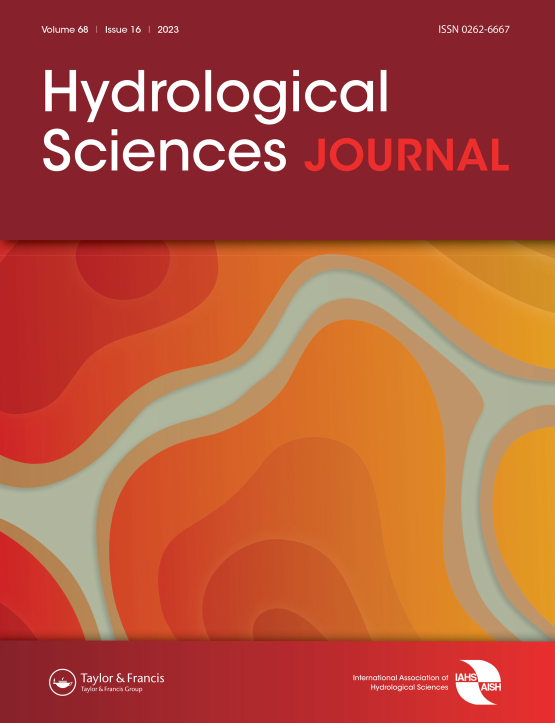Submit a Manuscript to the Journal
Hydrological Sciences Journal
For a Special Issue on
Contribution of isotope hydrology to water sciences in Africa: Revisiting foundations and exploring new research trends
Abstract deadline
Manuscript deadline

Special Issue Editor(s)
Aldo Fiori (Co-editor),
Roma Tre University
aldo.fiori@uniroma3.it
Frédéric Huneau (Lead Guest Editor),
University of Corsica
huneau_f@univ-corse.fr
Contribution of isotope hydrology to water sciences in Africa: Revisiting foundations and exploring new research trends
Guest Editors:
Bertil Nlend, University of Douala, Cameroon; nlendbertil@yahoo.fr
Josefina Hamutoko, University of Namibia; jhamutoko@gmail.com
Mahamat Nour Abdallah, University of N’djamena, Chad; mnourabdallah@gmail.com
Lamine Boumaiza, University of Texas at Austin, USA; lamine.boumaiza@jsg.utexas.edu
Guillaume Favreau, IRD; Niamey, Niger; guillaume.favreau@ird.fr
Raoul Kpegli, University of Abomey-Calavi, Benin; raoulkpegli@gmail.com
Seynabou Cisse Faye, Cheikh Anta Diop University of Dakar, Senegal; seynaboucisse.faye@ucad.edu.sn
Djim Diongue, Cheikh Anta Diop University of Dakar, Senegal; Djimmouhamadou.diongue@ucad.edu.sn
Chantal Djebebe Ndjiguim, University of Bangui, Central African Republic; ndjiguimlaure@yahoo.fr
Viaviana Re, Universty of Pisa, Italy; Viviana.re@unipi.it
This special issue aims to consider isotope applications over the continent of Africa, examining new research trends and the challenges facing isotope hydrology applications. It will showcase innovative solutions and success stories, and aims to promote an exchange of ideas and knowledge, as well as inspiring a new generation in using isotope hydrology to investigate environmental issues. We aim to promote a greater interest among water managers and the isotope hydrology community in Africa in the efficiency of using environmental isotope tracers for water resource studies.
Stable and radiogenic isotope tracers can provide valuable information to help investigate several environmental issues, including the identification of potential anthropogenic stressors affecting groundwater quality, understanding complex interactions between terrestrial and marine ecosystems, identifying subsurface biogeochemical processes governing the fate of contaminants within groundwater systems and assessing mixing between different water bodies. In addition, isotope hydrology offers an efficient tool that can be used to generally characterize both surface and groundwater systems, to study recharge processes and percolation into the subsurface, to investigate salinization across coastal aquifers, great lakes and river basins, to evaluate geothermal storage potential, dam leakage problems, and evapotranspiration partitioning. In Africa, the application of isotope hydrology has not yet been fully implemented: many regions still require investigation. Africa is endowed with important water resources. However, it is affected by several issues such as (i) uncontrolled agricultural practices, including the excessive use of synthetic/organic fertilizers and pesticides in agriculture to promote crop growth combined with return flow of irrigation water; (ii) improper industrial waste disposal, including discharge of untreated/partially treated wastewater and disposal of solid wastes; (iii) uncontrolled urbanization, leading to potential leakage from sewage systems and/or inadequate sanitation systems; and (iv) non-monitored exploitation. These concerns generally lead to numerous hydrological and eco-hydrological challenges with consequences on livelihoods, socio-economic development and environmental conditions.
Specific objectives:
- To share insights from isotope observation related to climate dynamic and atmospheric processes.
- To characterize groundwater recharge and percolation mechanisms within the subsurface.
- To share insights from describing surface and groundwater interactions
- To share an overview on the impact of anthropogenic stressors on hydrologic systems
- To explore how isotopes techniques can help water managers when regions are facing of data scarce
- To explore the role of isotope hydrology data in calibrating numerical models
- To provide policymakers, water managers, and stakeholders with valuable knowledge helping to make effective water resource decisions
Submission Instructions
Original research articles, reviews and perspectives on policy/management are invited on diverse topics including, but not limited to:
- isotopes in precipitation and atmosphere studies
- isotopes in water quality studies
- isotopes in groundwater age dating and paleoclimate
- noble gas isotope studies
- isotopes in surface water systems and catchment hydrology
- isotopes in water balance modelling and mapping
- isotopes in studies focusing on the complexity of transboundary aquifers
- isotopes in aquifer-surface water interactions
- isotopes in ecohydrology
- analytical techniques and measurement traceability
Abstracts may be submitted in the first instance to a Guest Editor of your choice; full manuscripts can then be submitted via the website, selecting the Special Issue by name. Articles will be published in regular issues of Hydrological Sciences Journal and will also be assembled in a Collection on the HSJ website.
